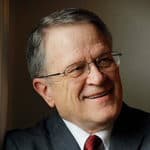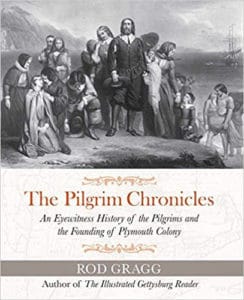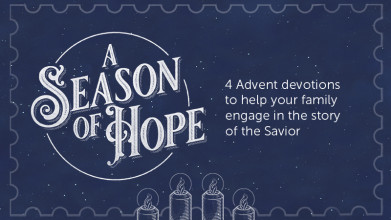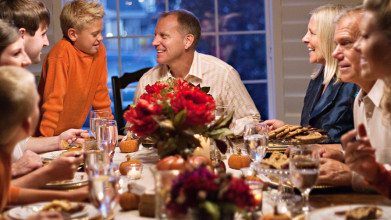John Fuller: Happy Thanksgiving from all of us here at Focus on the Family. And as your family and friends gather today, you have the treat of listening to historian Rod Gragg, as he helps us look back on what led to our traditions that we celebrate today. You’re going to hear about the Pilgrims’ journey to America and how their resilient faith in God carried them through some very difficult times. I’m John Fuller. And your host is Focus president Jim Daly.
Jim Daly: There are so many inspiring pieces to the story of Thanksgiving. And it’s good to reflect on the incredible Christian faith of these Pilgrims. These men and women and children left everything they knew and looked straight into the face of uncertainty all for the sake of having the freedom to worship God. And there’s no doubt we wouldn’t be here today as a nation if it weren’t for the bravery and unshakeable faith of those Pilgrims. And their story will inspire each one of us today. And I would encourage you to get the family together.
John: Mmm hmm.
Jim: If you can’t listen all together right now, download it on your phone or, you know, just get the app.
John: Get the app and listen to it. Yeah. There are great lessons here. This really is a family program for you to make sure that the next generation catches what many of us learned in school but isn’t taught so much anymore.
Rod Gragg has worked as an adjunct professor of history. He’s an award-winning author of more than 20 books. And today, we’ll be talking about The Pilgrim Chronicles: An Eyewitness History of the Pilgrims and the Founding of Plymouth Colony. We have that on our website. Let me just also mentioned that Rod and his wife live near Myrtle Beach.
Jim: Rod, welcome back to Focus.
Rod Gragg: Thank you. Happy Thanksgiving.
John: Thank you.
Jim: Yeah. Happy Thanksgiving – lots of turkey…
Rod: Yeah (laughter).
Jim: …And football.
(LAUGHTER)
Rod: Right. (Unintelligible).
John: It seems to be.
Jim: Hey. Rod, the Pilgrims’ story begins long before the Mayflower journey back in 1608. And, unfortunately, in so many schools today this history is not being taught. But that original group of separatists tried escaping from England before that, and they had gone to Holland. Tell us more about that and how the English were trying to capture them on their way to Holland. It really started before their pilgrimage to America.
Rod: Well, it did. And the driving force behind the people we know as Pilgrims today were a group of people known as the Separatists. And you have to put that in the historical context. In the late 16th century, the late 1500s, Cambridge University in England – there arose there in the wake of this great revival of Christianity we call the English Reformation, a movement among the faculty and students to try to reform certain things within the Church of England, the Anglican Church. And they wanted to purify it, not so much of doctrine. There was an agreement pretty much on that, biblically based Christianity. But there were worship practices they didn’t feel comfortable with, they thought didn’t reflect the New Testament model of the church and so on. And they wanted to purify the church, they said, of these worship practices. And that’s why they became known as Puritans.
Well, a spin-off group of those folks were called the Separatists. They were very nonconfrontational. They really didn’t want to try to confront church authorities and change the church. They just wanted to leave it. They wanted to separate. And their concern was they also wanted to see changes in worship form, but mainly church government. They believed that the local church ought to be autonomous and that church members ought to be able to choose their own leaders, pastors, elders, deacons. And so, they didn’t go along with the hierarchy of the Church of England. And that put them on the other side of the law, and so that they came under persecution as people who were known as dissidents or nonconformists. They just wanted to worship in a way they felt like was more biblical. And, that caused them to for a series of reasons – to undergo a great deal of persecution.
Jim: Yeah.
John: Hm.
Jim: These Puritan Separatists faced, as you said, many years of persecution leading up to the reign of King James I. And this is where probably American history, we falter, because we don’t know the connection to those leaders like King James I, Bloody Mary, Queen Elizabeth I and Archbishop Whitgift. Explain the role of these, you know, political leaders, these leaders of England at the time. And what were they doing to the Separatists?
Rod: Well, Queen Elizabeth had a long rule of almost a half century. And when she passed, she – the line of succession went to James VI, the King of Scotland. And, he kept peace for a long period time in England. And, he was considered by some to be a Bible scholar. He had actually written a commentary on the Book of Revelation. And so, when he came to power, the Puritans, mainline Puritans, and the Separatists thought – hoped that they’d have a friend on the throne, but they were wrong. His, kind of personal behavior and personality kind of bordered a bit on the bizarre. Historians look at him and think that he had suffered from paranoia. And he, behind the scenes, tended to be pretty profane and engaged in what was called fooleries at the time, meaning his favorite recreations, as they called them, were jesters performing kind of off-color skits and so on. But, his concern with all of these people who were called dissidents and Separatists were the fact that they didn’t want to follow the hierarchy of the Church of England. And his view was – and that really wasn’t a problem for the people in the pews. But for him, he looked at that as, “If you don’t obey my bishops, you’re not obeying me.” And he also held to the view of the divine right of kings, that if God allowed you to be a king, therefore, what you did had to be agreeable to God, and everyone should accept that. And so, he didn’t like the nonconformity that they had.
And early in his reign, they had asked – these Puritan leaders – for him to get behind the creation of the new English translation of the Bible. And that he agreed to and put together a tremendous team. And out of that came the most revered English Bible in our history, the King James Bible. Now, he probably could have called it the Puritan Bible, because it was their idea. The official name was the authorized version, but because the king had authorized it, it became known as the King James Bible.
But anyway, not long after that, there was an assassination attempt made on the king, something called the Gunpowder Plot. And he survived. And the Puritans, the Separatists, the dissidents had really nothing to do with that, but there was a crackdown on everybody. Anybody who was a nonconformist. So more than 300 Puritan pastors were removed from their positions. They lost their livelihood. They were banned from the church. And anyone who was involved in any nonconformist activity found themselves fined, imprisoned and punished, and that applied to the Puritans. And that created a wave of persecution that they wanted to escape.
Jim: Rod, you know, it’s fascinating; there’s nothing new under the sun, right? And, when you look at this and you hear the history – and you’re so knowledgeable of this history – there are some today who would like to remove some of our religious freedoms that we enjoy. And there is that parallel. How can the Pilgrims’ example inspire us to stay true to those convictions? I mean, we’re seeing it in the news all the time now where pressure groups are going after companies run by Christian CEOs that are being pressured to kind of jettison their understanding of Scripture for corporate, I guess, gain – I’m not even sure. And then others who are standing pretty firm. Hobby Lobby’s a great case in that. But what application can we learn from in this modern era from the Puritans and the Separatists?
Rod: Well, I think that God’s people, the church, really seems to flourish often most under those kind of pressures.
Jim: Yeah.
Rod: …under that kind of persecution. And that was – I think that was the case with the Pilgrims. Like I said, they were really nonconfrontational. They were very humble in spirit. They really were about living a Christ-centered life.
Jim: So, they kept the focus on that.
Rod: They kept that focus. And they wanted to worship in a way they felt like was biblical. They tried to get out. They tried to get to Holland. And they ran into problems. They arranged – some of them – for a Dutch ship to pick them up on the coast. They had taken the men aboard the Dutch ship when the militia arrived.
Jim: What did they see that Holland was offering?
Rod: Holland offered religious freedom, and so that’s why they wanted to go there.
Jim: Plain and simple.
Rod: That’s it. And, they were – they were thwarted in doing that. But eventually, they made their way. And in 1608, they were there and settled in Amsterdam, and then a group in Leiden. And that Leiden congregation was led by a pastor named John Robinson, Separatist pastor. And they were there. They stayed in Holland for about 10 years. And then, there were changes that occurred that concerned them. And they felt like they needed to leave. And so, where would you go? And the Dutch wanted to give them – the Dutch loved them. They thought they were model citizens, and they wanted them to settle in some of the Dutch colonies. But they finally decided to go to America.
Jim: You know, the – as you have said before when we’ve talked, those that relocated to Holland, one of their greatest concerns was the deprivation in Holland, that they felt it was too worldly. Yeah.
Rod: Well, it was a two-edged sword. They had the freedom of faith they wanted. But at the same time, because Holland allowed that as a permissive society, they also felt that the – the worldly ways of Holland, as they put it, were drawing their children away from their faith, and they were worried about other issues that were coming, and so they chose America. And that was no small decision to make. None of the English colonies or attempts to colonize in North America had succeeded at that time, except Jamestown. And it had been there only for about 13 years, and most of the people there had died, and they were holding on by their fingernails. And the Separatists, they were very educated; they were – I’m sure they had researched what things were like and reports coming from expeditions to North America. And at that time, the feeling was that wilderness America was a place of lions, tigers, headhunters, unicorns, three-headed snakes.
John: (Laughter) There weren’t…
Rod: …A very dangerous place to be.
John: There weren’t a lot of reliable reports, is what you’re saying.
Rod: That’s right. And they also faced this voyage across the Atlantic, which was really perilous. And a lot of ships just were – just disappeared into the Atlantic.
Jim: Yeah, storms and such.
Rod: And yeah – and disease. Disease wiped out people before they got there.
Jim: Rod, the Pilgrims, they – they finally did sail, as you’re saying, to North America. In November of 1620, I think they landed. They’d heard about Native Americans through art and word of mouth and some of the myths that you’re sharing. What impression did they have of these native people, and how did the – the native people view them? I mean, that had to be an extraordinary kind of confrontation – or introduction…
John: Yeah.
Jim: …it’s probably better stated that way.
Rod: Well, in the first place, they landed in the wrong place. You know, they landed at Cape Cod. Tried to get south, ran into bad weather, storms, shallows, came back and made the landfall there on Cape Cod and immediately began trying to make contact with the Native Americans to drop – to try to develop relationships with them. Ironically, their first contact was conflict. They ran into a band who had had bad experiences with English explorers and slave traders, and so they – they just opened fire on the group of Pilgrims who were exploring. Nobody was killed; maybe no one was injured. But that was their first contact. It was called “The First Encounter.” That was really ironic, because the Pilgrims really set a model for what could’ve been. And then eventually, when they did have contact with Native Americans, they developed a relationship with the Pokanoket tribe and their – its leader, Chief Massasoit, that really was a model. They had a 50-year peace treaty with them that really set an example of what could’ve been in America and too often was not.
John: Hm. Well, that is remarkable that they modeled Christ wherever they went – Holland and then here in America. And we’re listening today on Focus on the Family to Rod Gragg and his wonderful insights. And he’s captured so much of the story in a terrific book called The Pilgrim Chronicles: An Eyewitness History of the Pilgrims and the Founding of Plymouth Colony. And, you’ll find that book and other resources at focusonthefamily.com/broadcast.
Jim: Rod, the significant – I mean, there’s many significant things with this expedition and this desire to plant a colony in the New World. But the Mayflower Compact is really the core thesis, the core agreement amongst these people. For those that may not even know it now, because again, they’re not getting it in civics classes, what was it – the Mayflower Compact – and how did it become the antecedent to the Constitution and other great documents of America?
Rod: Well – and it’s kind of tied to their voyage. They had two months on the Atlantic, and they had to face things, when you cross the Atlantic, like scurvy and this horrible illness called bloody flux that just could wipe out people. They managed to avoid the illnesses coming across. They ran into storm season, because they were late. And they were in a deep storm, deep water, Atlantic. It looked like the Mayflower might go down. The main beam started splitting. And the Pilgrims came to the rescue, and they had brought a piece of machinery with them, a house jack or a printing press. No one knows. And they jammed that under the beam and held the ship together.
So, they made landfall. And they tried to go south, as I said, to get to where their destination actually was. Came back and decided, “We’ll do our colony here. Cape Cod.” That was November 11, 1620. First thing they did, though, was, they were outside the charter they had, which was supposed to be to the south. And so they had to have some kind of governance. And so, before they ever set foot, they drew up – ’cause they’re on their own now. They drew up this brief document – extraordinary thing – that became known as the Mayflower Compact, because they drew it up aboard ship before they went ashore. And in it, they basically stated that they were there by the grace of God, and they were making a precedent statement that our freedom comes not from the government, but it comes from God. And in the Mayflower Compact, you basically see this precedent for American culture, law and government based on these twin pillars of faith and freedom. And they signed off on that, and then they went ashore. So, that was their precedent that they set. And it’s been called often by historians America’s first constitution. And it did set, in its very simple way, a precedent for the government, the laws and the culture of America that would follow.
Jim: And of course, Jefferson would pull from that to include in the Constitution the idea of life, liberty and the pursuit of happiness – just that context.
Rod: Well, it’s no accident that the Declaration of Independence, which is our mission statement – the Constitution as our rule book – that the Declaration of Independence says that “it’s self-evident that all men are created equal and are endowed by their Creator with certain unalienable, God-given rights, including life, liberty and the pursuit of happiness” And all of that sprang out of – out of this early worldview, that was really biblically based, based on the Judeo-Christian worldview in the sense that all people of equal value before God, which meant that government should be by the governed.
John: Earlier, Rod, you had mentioned Pastor John Robinson. He was a strong spiritual force for the Pilgrims. Describe his impact.
Rod: He made a great impact. And I like to say he – he is the man who impacted the Pilgrims more than any man who never came to America. They decided they would come in two groups while they were in Holland. And he was going to bring the larger group, and the larger group was the group decided they wanted to follow up. So, he stayed behind. And there’s a record that he gave this remarkable farewell address to them while they were on the docks in Holland about to board the Speedwell to go to hook up with the other folks in the Mayflower. A very emotional time. And he gave this farewell to them, urging them to trust in the love and the sovereignty of God. And then off they went. Now, he planned to come with others, but ironically, a plague swept through Holland, and it cost many lives, including many of those in the congregation of Leiden, and including Pastor Robinson. And yet he sent with them a letter, which they opened later and read. And his…
John: After his death.
Rod: …influence really was striking. And he encouraged them to show the love of Christ to all, to not bicker with each other, to not fall into dissension with each other and others, and to treat others with the love of Christ. That was his message to them. And when you look at the Pilgrims, especially as you compare them to others in the day, you see this – just this remarkable approach, this sense of humility and the sense of this willingness to endure. And this faith and trusting in God, which they needed, because while the voyage – they survived that voyage, when they got to New England, they began to die. And half of them would die, just in a few months.
Jim: What are those numbers? Give us some context.
Rod: Well, they started dying on the ship before they even went ashore. And they stayed on the ship for another two months, while they were finding a place to live and setting up their settlement and building their houses. And some type of illness ran through there, and you know, don’t know what it was; typhoid fever, bronchitis that led to pneumonia – we don’t know. But they began to die. There were 102 of them – 105 if you count three unborn children that were coming with them. And of the 102, half their number died.
Jim: Ah, significant.
Rod: And – and some died. And some days, they had one die a day. Sometimes they had two die a day. And they got to the point where there were so many who were sick that the few living had trouble dealing with the sick and burying the dead. And at one point in that winter, which was called the great sickness, there were only seven people who were still standing and able to care for the others. But they did. They did do that. And in the spring, they emerged from that and just set their sights on what they were supposed to do and kept going forward.
John: Hmmm.
Jim: That is something to think of – only 7 out of 100, 102.
Rod: Well, that were still – still able to…
Jim: Capable.
Rod: …capable to function. And when the winter was all over, they had lost half their number. And they had about 52 who were there. And out of those 52 people, you see this extraordinary development that impacted all of America.
Jim: Well, and that group then, I assume, chose William Bradford as the new governor after, I think, it was Governor Carver had died. Describe how he – Governor Bradford – encouraged the colony to celebrate – and we’re getting to Thanksgiving, ’cause that’s the day we’re celebrating today – this very first Thanksgiving.
Rod: Well, he did…
Jim: What was that conversation like?
Rod: Well, they had come through this awful time, and they had gotten help from the Native Americans they had befriended – particularly, from Chief Massasoit and from a Native American man named Squanto, who had helped them with wilderness skills, how to grow maize – corn. Really, Massasoit and Squanto really helped them survive, and they considered them to be gifts from God. And so they came through all of that, and they had a good harvest. And so, they wanted to have a Thanksgiving. Now, this wasn’t the first Thanksgiving in America. The Catholic colonists in New Spain had celebrated a thanksgiving of sorts, and Jamestown colonists had and others. But this is what inspired our Thanksgiving.
And, we know there were two records – one by Edward Winslow and one by William Bradford. And so, we know kind of what it was like, and we know a good bit about what they ate. If it was typical of the Thanksgivings they had before and after, there was a worship service. And then they recorded that this lasted for about three days. They had almost a hundred of the Pokanoket Indians there and with Chief Massasoit as their guest. They brought venison. They engaged in recreations. The English of the day, particularly the Puritans, loved field sports, so they – they probably engaged in jumping contests, races, wrestling matches…
Jim: (Laughter).
Rod: …if you can imagine the Puritans having wrestling matches.
John: No football, though, huh?
Rod: No football.
(LAUGHTER)
Rod: And, they said they exercised their arms, which meant…
Jim: (Laughter).
Rod: They – they were using firearms. And they either had a shooting match, or maybe demonstrated the firearms for the Pokanoket. And this went on for three days. We do know from the record of – what their menu was on that first Thanksgiving.
Jim: Pretty elaborate, actually.
Rod: Well, actually, we know that they had venison that the Pokanoket brought them. They also were on record as having wild turkey and what they called waterfowl, which – probably geese or duck. Then we know from what they ate afterwards – they were eating that. They also probably had lobsters, clam, codfish, sea bass. They would have had English peas, corn, roasted ears, corn pudding, cabbage, and one thing we don’t have too often that they probably had based on what they ate later and that’s baked beaver.
Jim: Baked beaver.
Rod: Right.
John: They don’t offer that at my local grocery store.
Jim: Yeah.
Rod: (Laughter) Yeah.
John: (Laughter).
Rod: So, some differences, but a lot – a lot in common today. So, you know, the view that we have of the Pilgrims today and Thanksgiving – you know, the wide-brimmed hats, and the black clothing and the white bonnets on the women and all that – that’s probably not accurate. That was really Dutch dress. They were English, so they probably didn’t dress like that. But it’s not that we’re really wrong or inaccurate; it’s just one-dimensional. And when you go beyond that and go into the culture of these folks and into their story, you see this remarkable, extraordinary people.
And you think only 50 of them survived. But they inspired the Puritans – mainstream Puritans. They saw that they had survived. And so, the English civil war was beginning, and the Puritans began to come. They saw that these Separatists had made it, and they didn’t come in one ship. They came in fleets. They came in 200 people, 800 people, a thousand people at a time. And they really transformed New England with the Massachusetts Bay Colony and those same values, that same sense of self-government. Those same twin pillars of faith and freedom. The Puritans just spread that throughout, eventually, the 13 colonies. Their impact was so great. But they were inspired to be there and do that by the people we call the Pilgrims.
Jim: Rod, you know, as we gather for Thanksgiving – I have two teen boys, and, I mean, our listeners have kids of all ages, right? And we get together. What’s a good reflection to think about? I mean, they did this. They did the most incredible thing, to pick up, to uproot, to travel, you know, very treacherous waters to come to a place where they didn’t have any guarantee of survival. In fact, half of them died. When you look at that sacrifice and what they were searching for, which was freedom to, um, worship God the way they deemed appropriate reading Scripture and to treat people the way they felt the New Testament and the Lord asks them to treat people. It’s an amazing achievement in so many ways. And I know, as an historian, this is a very difficult question for you. But if they had the advantage of seeing America today, you know, 350 years later, what do you think, knowing them through the writings, et cetera, what would they look at and say, “This is good”? And then what would they be concerned about?
Rod: Well, you’re asking a historian to do what we’re not ever supposed to do, and that’s speculate. But it’s a fair question.
John: (Laughter).
Rod: And I have thought about that. I think they would be impressed by our technology, and I think they would be encouraged by the impact that America’s had on the world.
Jim: Kind of that innovation.
Rod: Yeah. I think they would look at much of our culture – and particularly how we seem to be divisive often – and I think they would look at it a lot, and it would grieve them. But I think that when we look back, as you said, in the beginning and think, “Well, what can we get from them today?,” they went through this incredible ordeal. And they trust in the sovereignty of God, and they held to this biblical faith. And they really tried, from all that you read that they wrote about and their model they set, they really tried to approach life with the love of Christ. And also with a sense of humility and gratitude. And at that first Thanksgiving, Edward Winslow, who recorded part of this, made the statement, after all they had gone through, after all the people they loved had died and gone, after all these great struggles they had faced, and still looking and knowing what the uncertainty of the future was, he wrote that – in his words, “We are far from want by the goodness of God.” So there was this remarkable sense of humility and a sense of dependence on the grace of God that remains today when we look at these people.
Jim: That’s exactly right. And that attitude that we should have gratitude in our heart for what God has done – that’s a good place to be thankful today and to remember during Thanksgiving. Rod Gragg, this has been terrific. What a wonderful work that you’ve put together, this amazing book, The Pilgrim Chronicles. We have it available here at Focus on the Family.
And as we often do, John, if you, the listener, can make a gift of any amount to support what we do – to strengthen marriages, to help save a baby’s life – if you can just send a gift of any amount, we’ll send you a copy of Rod’s great book, The Pilgrim Chronicles, as our way of thanking you for letting us do the good work that God has called all of us to participate in. And we’re grateful for it.
John: Yeah. Your partnership is crucial. And, our offices are closed today as our staff celebrates today and tomorrow – some family time. But online, 24/7, you can donate and get Rod’s book. It’s focusonthefamily.com/broadcast.
Jim: Rod, again, thank you for enlightening our Thanksgiving celebration. Great to have you.
Rod: Thank you – my pleasure. And again, Happy Thanksgiving.
Jim: You, too.
John: Well, be sure to get a copy of Rod’s book and make a donation if you can. Once again, focusonthefamily.com/broadcast.
And tomorrow we’ll turn the corner and help you really zero in on practical and meaningful ways to focus on Christ during the Christmas season.
On behalf of Jim Daly and the entire team, thanks for listening to Focus on the Family. I’m John Fuller inviting you back as we once again help you and your family thrive in Christ.



















